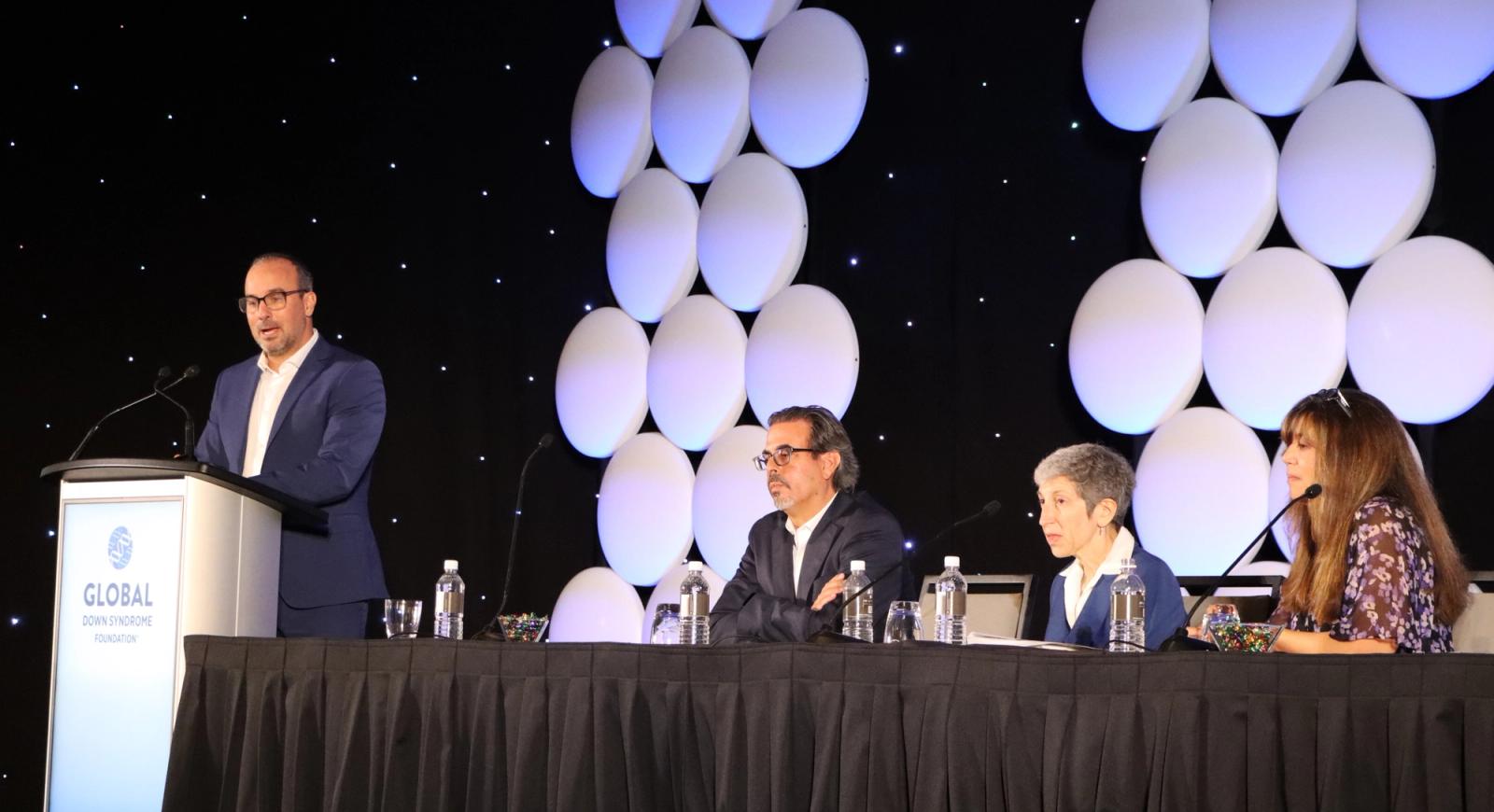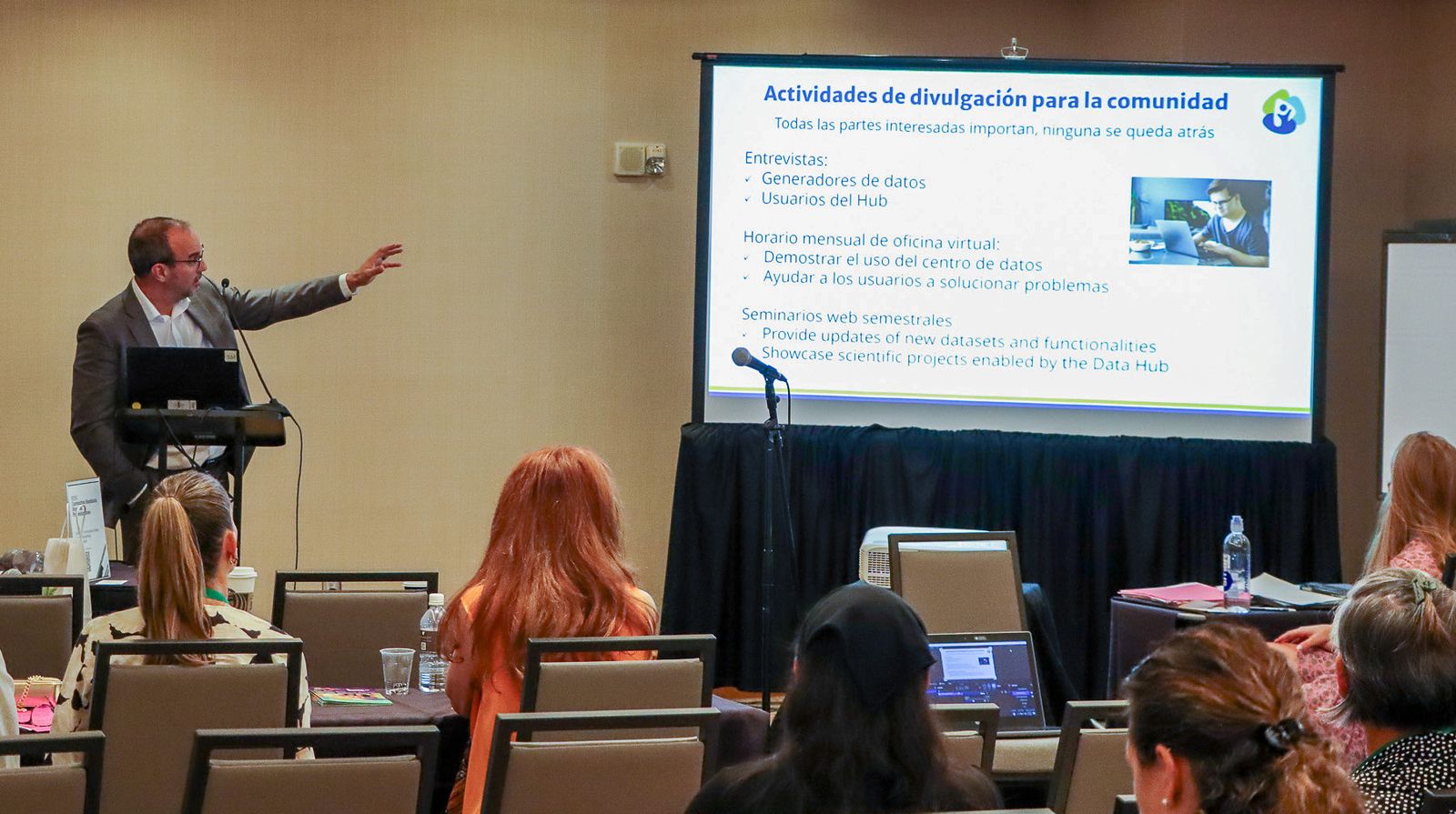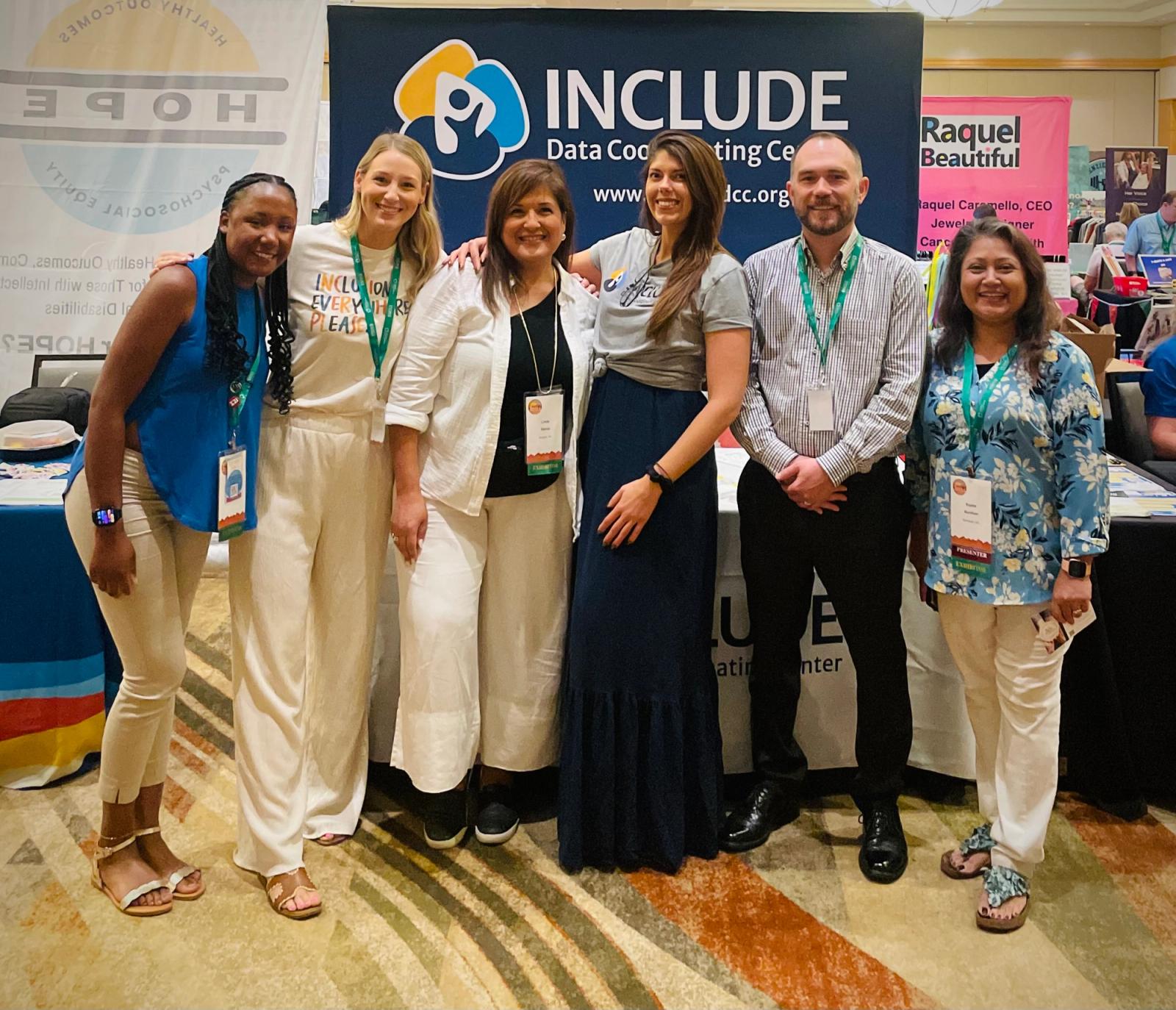
The INCLUDE Data Coordinating Center (INCLUDE DCC) attended the National Down Syndrome Congress (NDSC) Convention and the Down Syndrome Medical Interest Group (DSMIG) Symposium from July 25-28, 2024, in Phoenix, AZ. In addition to our booth presence alongside The INCLUDE (INvestigation of Co-occurring conditions across the Lifespan to Understand Down syndromE) Project, several key members of our team delivered impactful presentations throughout the busy weekend.
Thursday, July 25th, 2024
Global Research and Medical Care Roundtable
The GLOBAL Research & Medical Roundtable is a collaboration with the NDSC and includes leading Down syndrome (DS) experts who discuss important research and medical care initiatives. Amongst the speakers was Dr. Joaquin Espinosa presenting, "An Important Update on Groundbreaking Clinical Trials & Research Benefiting People with Down Syndrome," Dr. Melissa Parisi, "The NIH INCLUDE Project: Accelerating Research Discoveries for People with DS Across the Lifespan," and Dr. Michael Rafii on, "Down Syndrome in a New Era of Alzheimer’s Disease."
Friday, July 26th, 2024
NIH INCLUDE Project and Clinical Cohort Studies: How DSMIG can partner with the NIH to increase representation.
Dr. Meghan O'Neill and Dr. Melissa Parisi provided an in-depth overview at the Down Syndrome Medical Interest Group (DSMIG) Symposium about the INCLUDE Project, highlighting key goals and objectives, scope of funding and current awards, accomplishments to date, community engagement and outreach, funding and training opportunities, as well as upcoming initiatives. In particular, they highlighted the DS Cohort Development Project (DS-CDP). A multi-year, multi-site longitudinal cohort study that will expand our knowledge about individuals with DS worldwide, launching in mid-late 2024. The NIH hopes to partner with professionals from DSMIG to develop and execute an effective research plan that engages people with DS from diverse backgrounds and communities.
Part 1: Growing Pains: What We Know About Growth Hormone and Down Syndrome and Reaching New Heights
Part 2: New Heights: Research on Musculoskeletal Abnormalities and IGF1 Signaling in DS
Tariq Ahman, MD; Joaquin Espinosa, PhD; Noemi Spinazzi, MD; Larry Suva, PhD
Dr. Tariq Ahmad and Dr. Noemi Spinazzi covered part 1 of the talk on growth hormone physiology and discussed the question of whether or not replacements and supplementation of growth hormones are safe and effective.
INCLUDE Investigators, Dr. Joaquin Espinosa and Dr. Larry Suva, shared part 2 of the presentation. Dr. Espinosa spoke on the importance of dysregulation of the Growth Hormone (GH) - Insulin-Like Growth Factor 1 (IGF1) signaling pathway in DS. He presented recent research describing the broader impacts of IGF1 deficiency in DS and discussed upcoming clinical trials comparing the safety and efficacy of GH and IGF1 supplementation. Additionally, Dr. Suva covered GH action growth regulation and Ts21 bone health.
Developing Capacity for Community-Based Participatory Research - A Community Research Advisory Board (CRAB)-Led Initiative
Dara Mendez, PhD, MPH; Mario Browne, MPH, CHES, CDP
The Community Research Advisory Board (CRAB) was established in 2001 at the University of Pittsburgh to advise researchers on how best to engage vulnerable and historically underrepresented populations. The Alzheimer’s Disease/Down Syndrome Engagement (ADDORE) Core Supplement is a project that establishes a community-led training and immersion experience to address community needs and increase literacy about brain aging, Alzheimer’s Disease, and DS. This is done through collaborations with both the CRAB and the Alzheimer’s Biomarkers Consortium - Down Syndrome (ABC-DS) project, which is an INCLUDE-funded study.

Saturday, July 27th, 2024
Exploring the Latest Discoveries in Down Syndrome Research: Cutting-Edge Clinical Trials and Groundbreaking Results!
Dr. Joaquin Espinosa gave a live demonstration of the newly expanded INCLUDE Data Hub and explained how it is accelerating discoveries that benefit people with DS.
*Spanish: A global approach to DS research: United States, Latin America and beyond / "Un Enfoque Global de la Investigación sobre el SD. Estados Unidos, América Latina y Más Allá
Dr. Joaquin Espinosa presented on the Latin American Network of the Human Trisome Project which supports the development of new DS biobanks and access to cutting-edge resources for scientists and clinicians to advance DS studies in Latin America. This led to a live demonstration of the INCLUDE Data Hub and the Investigator Registry, which included information on ongoing research projects and how the tools and INCLUDE DCC are accelerating discoveries that benefit people with DS.
What matters to you? Learn how you are advancing INCLUDE-funded research to address your needs.
Members of the INCLUDE Project team, Dr. Sujata Bardhan and , Dr. Aruna Natarajan, as well as Dr. Stephanie Santoro, an INCLUDE-funded investigator, presented an engaging session to families and gave parents ways to participate in research. The panel highlighted clinical study results funded by INCLUDE, with potential benefits for individuals with DS and their families as well as innovative approaches to increase diversity in clinical studies by including participants with DS on research teams.

Sunday, July 28th, 2024
Giving Families Options: What’s New in Clinical Trials to Treat Sleep-Disordered Breathing in Children
Obstructive Sleep Apnea (OSA) is associated with growth failure, systemic and pulmonary hypertension, and cognitive and behavioral challenges. During this session, Dr. Marishka Brown, Director of the National Center on Sleep Disorders Research at the National Heart, Lung, and Blood Institute (NHLBI) of the NIH and INCLUDE investigators, Dr. Derek Lam, Dr. Susan Redline, and Dr. Daniel Combs showcased three of the current sleep-focused clinical trials that are part of the NIH INCLUDE Project.
Dr. Marishka Brown outlined the role of sleep in positive health promotion and highlighted the national agenda for sleep and circadian research found in the NIH Sleep Research Plan – specifically focusing on sleep health disparities. The INCLUDE Investigators each discussed sleep apnea and clinical trials available:
- Treatment of Obstructive Sleep Apnea with Personalized Surgery in Children with Down Syndrome (TOPS-DS) - (clinicaltrials.gov, NCT05508971).
- Oxygen Therapy in Children with Down syndrome and Obstructive Sleep Apnea (DOSA) - (clinicaltrials.gov, NCT06043440).
- The Combination of Atomoxetine and Oxybutynin for the Treatment of Obstructive Sleep Apnea in Children with Down Syndrome (clinicaltrials.gov, NCT04115878).
For general inquiries about the INCLUDE Project, please email DownSyndromeINCLUDE@mail.nih.gov.